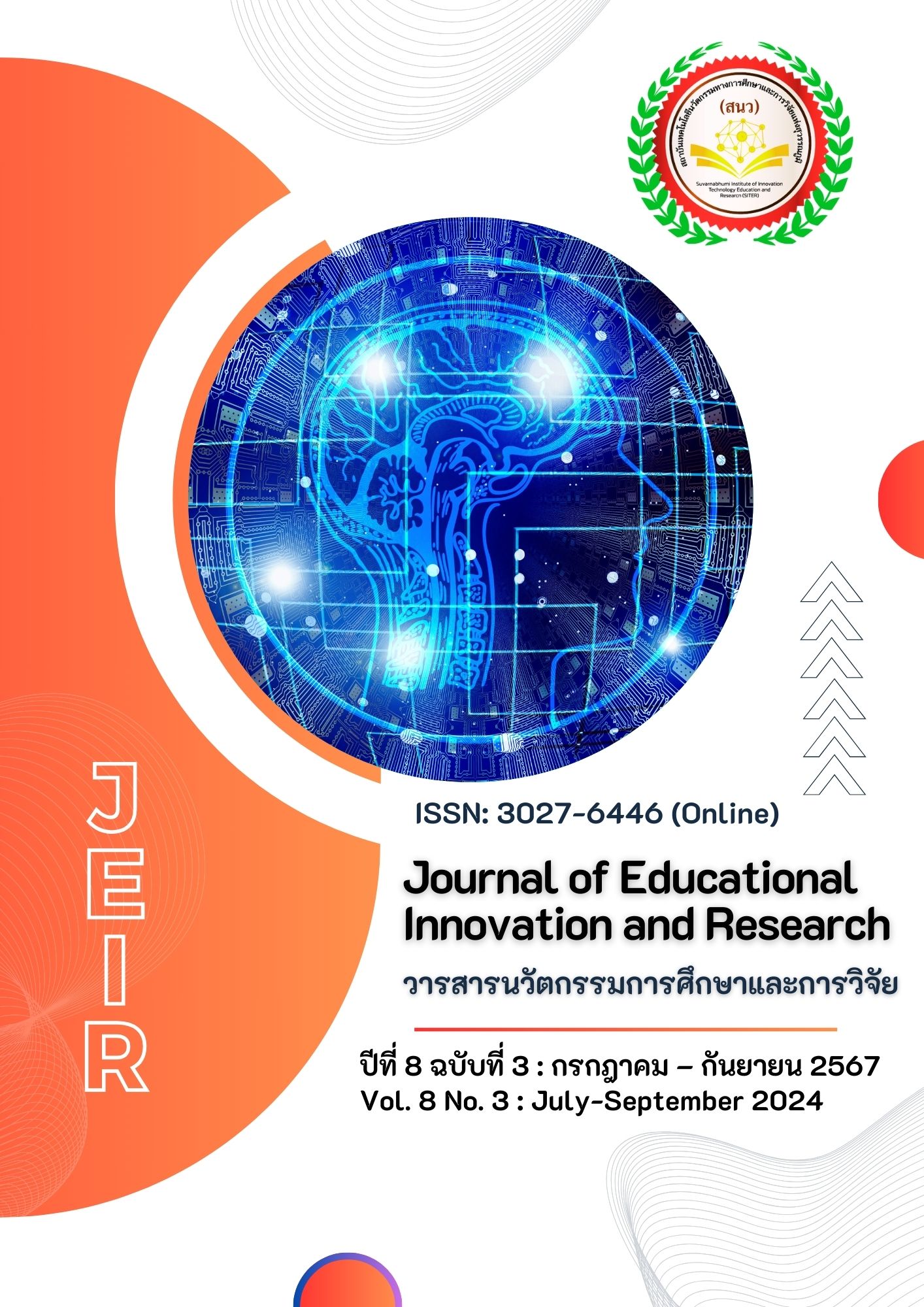การศึกษาความสามารถของนักศึกษาครูในการเลือกและนำงานทางคณิตศาสตร์ ไปใช้ในการจัดการเรียนรู้
Main Article Content
บทคัดย่อ
การวิจัยนี้มีวัตถุประสงค์ เพื่อศึกษาความสามารถของนักศึกษาครู ในการเลือกและนำงานทางคณิตศาสตร์ไปใช้ในการจัดการเรียนรู้ กลุ่มเป้าหมายในการวิจัยครั้งนี้ คือ นักศึกษาครูชั้นปีที่ 4 สาขาวิชาการสอนคณิตศาสตร์ คณะศึกษาศาสตร์ ที่เรียนในรายวิชาเรื่องเฉพาะทางการเรียนการสอนคณิตศาสตร์ (Selected Topics in Mathematics Instruction) ภาคเรียนที่ 2 ปีการศึกษา 2564 จำนวน 18 คน เครื่องมือที่ใช้ในการวิจัยครั้งนี้ ได้แก่ 1) แผนการจัดการเรียนรู้ที่ส่งเสริมความสามารถในการเลือกและนำงานทางคณิตศาสตร์ไปใช้ และ 2) แบบบันทึกหลังการสอน ข้อมูลจากบันทึกหลังการสอน วีดิทัศน์บันทึกกิจกรรมการเรียนรู้ คำตอบของนักศึกษาครูในใบกิจกรรมการเรียนรู้ และอนุทินถูกนำมาใช้ในการตอบคำถามวิจัย ผู้วิจัยวิเคราะห์ข้อมูลด้วยวิธีการวิเคราะห์เชิงเนื้อหา ผลการวิจัย พบว่า
1. นักศึกษาครูทุกคน แสดงความเข้าใจปัจจัยที่เกี่ยวข้องกับงานทางคณิตศาสตร์ที่มีผลต่อการเรียนรู้ของนักเรียน โดยการออกแบบงานทางคณิตศาสตร์ตามเป้าหมายที่กำหนด
2. นักศึกษาครูทุกคน สามารถวางแผนการนำงานทางคณิตศาสตร์ที่ส่งเสริมสติปัญญาขั้นสูงไปใช้ในการจัดการเรียนรู้ เพื่อเปิดโอกาสในการเรียนรู้ของนักเรียนตามบริบทที่กำหนด
3. นักศึกษาครูทุกคน สามารถวิเคราะห์ และสะท้อนคิดเพื่อพัฒนาการนำงานทางคณิตศาสตร์ไปใช้ในการจัดการเรียนรู้ โดยในบทบาทของผู้สังเกตการสอน นักศึกษาครูวิเคราะห์ความสัมพันธ์ระหว่างการกระทำของครูและลักษณะของงานทางคณิตศาสตร์ที่ส่งผลต่อโอกาสในการเรียนรู้ของนักเรียนส่วนบทบาทของผู้สอน นักศึกษาครูสะท้อนคิดเกี่ยวกับการเลือกและนำงานทางคณิตศาสตร์ ไปใช้จัดการเรียนรู้ เพื่อนำไปสู่เป้าหมายการเรียนรู้
Article Details

อนุญาตภายใต้เงื่อนไข Creative Commons Attribution-NonCommercial-NoDerivatives 4.0 International License.
เอกสารอ้างอิง
Arbaugh, F., & Brown, C. A. (2005). Analyzing Mathematical Tasks: A Catalyst for Change? Journal of Mathematics Teacher Education, 8(6), 499-536. https://doi.org/10.1007/s10857-006-6585-3
Barber, K. (2016). Developing mathematical-task knowledge through lesson study [Doctoral dissertation, Syracuse University].
Borko, H., & Livingston, C. (1989). Cognition and Improvisation: Differences in Mathematics Instruction by Expert and Novice Teachers. American Educational Research Journal, 26(4), 473-498. https://doi.org/10.2307/1162861
Boston, M. D., & Smith, M. S. (2009). Transforming Secondary Mathematics Teaching: Increasing the Cognitive Demands of Instructional Tasks Used in Teachers' Classrooms. Journal for Research in Mathematics Education, 40(2), 119-156. www.jstor.org/stable/40539329
Boston, M. D., & Smith, M. S. (2011). A ‘task-centric approach’ to professional development: enhancing and sustaining mathematics teachers’ ability to implement cognitively challenging mathematical tasks. ZDM, 43(6), 965-977. https://doi.org/10.1007/s11858-011-0353-2
Chapman, O. (2013). Mathematical-task knowledge for teaching. Journal of Mathematics Teacher Education, 16(1), 1-6. https://doi.org/10.1007/s10857-013-9234-7
Hargrove, D. L. (2015). Developing Primary (K-2) Teachers' Understanding of High Cognitive Demand Mathematical Tasks (Publication Number 3706599) [Doctoral dissertation, George Mason University].
Henningsen, M., & Stein, M. K. (1997). Mathematical Tasks and Student Cognition: Classroom-Based Factors That Support and Inhibit High-Level Mathematical Thinking and Reasoning. Journal for Research in Mathematics Education, 28(5), 524-549. https://doi.org/10.2307/749690
Henningsen, M. A. (2000). Engaging middle school students with cognitively challenging mathematical tasks: Classroom factors that influence students' high -level thinking, reasoning, and communication during consecutive lessons (Publication Number 9998644) [Doctoral dissertation, University of Pittsburgh].
Osana, H. P., Lacroix, G. L., Tucker, B. J., & Desrosiers, C. (2006). The Role of Content Knowledge and Problem Features on Preservice Teachers’ Appraisal of Elementary Mathematics Tasks. Journal of Mathematics Teacher Education, 9(4), 347-380. https://doi.org/10.1007/ s10857-006-4084-1
Silver, E. A., & Stein, M. K. (1996). The Quasar Project: The "Revolution of the Possible" in Mathematics Instructional Reform in Urban Middle Schools. Urban Education, 30(4), 476-521. https://doi.org/10.1177/0042085996030004006
Smith, M., & Stein, M. (1998). Selecting and Creating Mathematical Tasks: From Research To Practice. Mathematics Teaching in the Middle School, 3(4), 268-275.
Stein, Kay., M., Smith, Schwan, M., Henningsen, A., M., Silver, & A., E. (2009). Implementing Standards-Based Mathematics Instruction: A Casebook for Professional Development. Second Edition. Teachers College Press.
Stein, M. K., Engle, R. A., Smith, M. S., & Hughes, E. K. (2008). Orchestrating productive mathematical discussions: Five practices for helping teachers move beyond show and tell. Mathematical Thinking and Learning, 10(4), 313-340.
Stein, M. K., & Lane, S. (1996). Instructional tasks and the development of student capacity to think and reason: An analysis of the relationship between teaching and learning in a reform mathematics project. Educational Research and Evaluation, 2(1), 50-80.
Whitehead, A. N. (2017). Preservice Teachers' Visions, Implementation, and Post-Lesson Analyses of Mathematical Tasks: A Longitudinal, Case-Study Design (Publication Number 10610848) [Doctoral dissertation, North Carolina State University].


